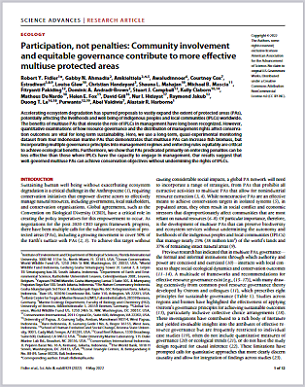
Accelerating ecosystem degradation has spurred proposals to vastly expand the extent of protected areas (PAs), potentially affecting the livelihoods and well-being of indigenous peoples and local communities (IPLCs) worldwide. The benefits of multiuse PAs that elevate the role of IPLCs in management have long been recognized. However, quantitative examinations of how resource governance and the distribution of management rights affect conservation outcomes are vital for long-term sustainability. Here, we use a long-term, quasi-experimental monitoring dataset from four Indonesian marine PAs that demonstrates that multiuse PAs can increase fish biomass, but incorporating multiple governance principles into management regimes and enforcing rules equitably are critical to achieve ecological benefits. Furthermore, we show that PAs predicated primarily on enforcing penalties can be less effective than those where IPLCs have the capacity to engage in management. Our results suggest that well-governed multiuse PAs can achieve conservation objectives without undermining the rights of IPLCs.














